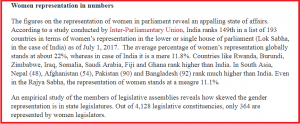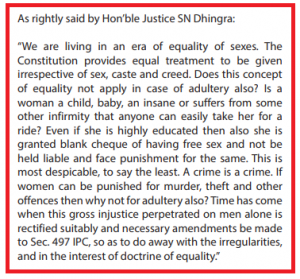In this blog post I will try and as comprehensively as is possible in a blog post, assess whether our Indian Legal system reflects the true spirit of Feminism or not. In case you would like to know more, please click on the hyperlinks throughout the post for in-depth study.
Purpose of Law
The law of the land is meant to guide people along the path of acceptable behaviour. Those who stray from the path become liable for punishment. It also upholds the rights of all of its people.
The Origin: The Constitution of India
The Constitution of India is the holy grail of the Indian Legal System. It is the supreme law. It bestows Equality, Freedom, Fraternity and Justice upon the citizens of India. It lays down the basic framework based on which every other law in India has been enacted. No law can be passed in our country if it does not agree with the Constitution of India.
Now Article 14 and 15 of the Constitution of India touch upon Equality
Article 14: Equality before Law
“The state shall not deny to any person equality before the law or the equal protection of the laws within the territory of India.”
This article without any exception, clearly indicates that men and women are equal in the eyes of law.
Article 15: Prohibition of Discrimination on grounds of Religion, Race, Caste, Sex or Place of Birth
If the article is read solely form the angle of Gender Equality –
- There can be no discrimination in general on the ground of sex,
- Special provision in the case of women and children are permissible.
Article 15 reinforces the equality principle in Article 14 but it also provides for special provisions for women if the need arises.
The rationale behind special provisions for women
Article 15 of the Constitution of India, allows for special provisions for women. And there are valid reasons for it. Women were and still are a minority group when it comes to several rights. Their position needs to be alleviated for true equality to be achieved. This is the reason why the law allows the State to support women in the following ways:
a) Setting up institutions exclusively for women
b) Reservation for women at public entertainments or in public conveyances
Before you think that women abuse this protection, please read this article by Bindu N. Doddahatti, an advocate at the Alternative Law Forum, Bangalore that busts the myth.
Gender Disparity in the Lawmakers and Protectors
The following 3 facts indicate the Gender disparity that exists in our lawmakers.
a) Drafting the Constitution of India
There were only 15 women members in the Constituent Assembly comprising of 299 members led by B.R. Ambedkar who debated and drafted the Constitution of India. Only a mere 5% of women had a say in the drafting of the supreme law of the country.
b) Low representation of women in Parliament
The following extract from an article in ‘The Wire’ lays bare the dismal statistics of women in politics.
The Parliament makes the laws of the country. A mere 11.8% of women have a say in the laws made by the supreme legislative body of our country.
c) Low representation of women in the Indian Judiciary
Our Courts uphold the rule of law. And yet after 70 years of the judiciary, we have 1 current woman Supreme Court Judge out of a total of 25 i.e. 4% with the historical numbers being 6 out of 229 i.e. 2.6%. Senior Advocate Indu Malhotra is set to join the current sitting judge– Justice Bhanumati, with the latter set to retire in 2020. We have never had a woman Chief Justice of India.
The state of the High Courts is slightly better with 4 Chief Justices and 68 women judges comprising of 10.86% of the total number of judges.
How can our lawmakers and protectors be expected to uphold the law in its true spirit of Feminism when wide gender disparity is present in these systems?
Our laws
- Several laws have been enacted to protect the rights of women. And yet the sex ratio in India is on the decline!
- Many laws and provisions do not reflect the spirit of Feminism. In an extensive ana 2014 UN Report found several aspects lacking in our laws. The report finds the Hindu Succession Act 1956 to contain provisions that favour the husband’s family. According to the report the implementation of the Dowry Prohibition Act 1961 has been weak and how the courts have interpreted the definition of “dowry” narrowly. Read a summary of the report as published by digital news outlet, Quartz India.
- Some laws and provisions that would further the cause of Feminism are waiting to be enacted
- Criminalizing Marital Rape – By not considering marital rape as an offence, today we are condoning domestic violence.
- Women’s Political Participation Act – We know from about the lack of women in our law making bodies and yet this law is waiting to be passed.
- Decriminalizing homosexuality – Feminism propagates equality for all and hence stands against the discrimination of the members of the LGBTQ community
- Amending the Medical Termination Of Pregnancy Act, 1971 – The conditions under which an abortion can be carried out are too rigid. Women must have more rights over their body.
- Some provisions are biased in favour of women and wrongfully so – such as the provision for adultery in the IPC.
Section 497, Indian Penal Code, 1860 makes adultery (sexual intercourse not amounting to rape) in marriage a crime with punishment up to 5 years of imprisonment or with fine or both.
- It suffers from constitutional vices because it is tilted in favour of the women for the following reasons:
- A woman cannot be punished under the section for adultery and neither does she have the right to prosecute her own husband for adultery. Only the aggrieved husband has the right to prosecute the accused husband.
- Adultery with a married woman is a punishable offense and not that with an unmarried woman
- If a woman commits adultery with the consent or owing to the connivance of her husband, then it is not considered a criminal offense at all. This reduces the woman to be the ‘property of her husband’
- The woman who commits adultery is not considered an abettor and is not liable to punishment under the section.
Here is an extract from a reputed legal source that summarizes the issue beautifully.
Sec 497 of the IPC must be amended to reflect gender equality. In view of the fact that adultery is not a threat to society, there have also been recommendations that the section needs to be decriminalized.
5. Patriarchy has not spared our justice system:
- Judgements: Forcing Husband To Get Separated From His Parents, Amounts To ’Cruelty’ – this is a SC judgement. There are several others like these. But if our judges are primarily men who have been socially conditioned to believe in certain norms of our society, we can’t really blame them.
- Legal Language: Social activist Avantika Tiwari highlights the patriarchal tone in the language of the law in her spirited article commenting on the provisions of Section 354 and 509 of the Indian Penal Code. Section 354 deals with “criminal assault of women to outrage women’s modesty”, and Section 509 speaks of punishing an individual /individuals for using a “word, gesture or act intended to insult the modesty of a woman.” What this means is…
From the above analysis, we can see that a lot has been done by our Indian Legal System to bring down gender inequality. However loopholes in the provisions, bottlenecks in their implementation, gender disparity in justice system and non- existence of some important laws defeat the principle of Feminism.
While in most cases, it favours the male gender, the provision for adultery is skewed in favour of the woman. The imbalance in both cases must be rectified. While social conditioning is required to change the perceptions and behaviours of people, a robust and supportive legal system will accelerate the transformation.
Disclaimers:
I am not a law professional. I have studied some aspects of law. But overall my understanding of law is basic. The research for the entire article is based on secondary resources and some help from some lawyer friends who also helped vet this post.
I am no Kamla Bhasin, the famous Feminist and Activist. I am at the nascent stage of the Feminism journey. I am still speaking from personal experiences or learning from other feminist voices.
As I live, I shall learn. In case someone who is reading this knows more about Law or Feminism or both, do let me know. I promise to hear you out and incorporate changes if so need be.
Reading time: 7 min







 Labels that make me, me: #FreelanceWriter #Instawriter #Blogger #Narcissisticabuse survivor #HighlySensitivePerson (#HSP) #Empath #Introvert #Feminist
Labels that make me, me: #FreelanceWriter #Instawriter #Blogger #Narcissisticabuse survivor #HighlySensitivePerson (#HSP) #Empath #Introvert #Feminist




Recent Comments